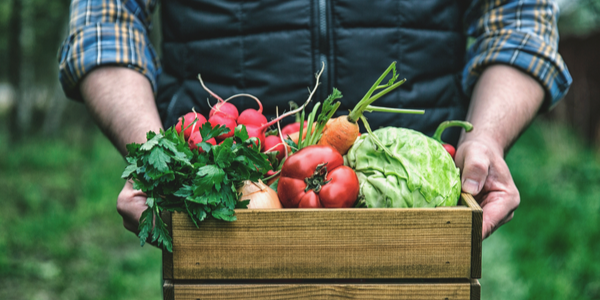
A quick trip to the grocery store can spark a lot of unanswered questions. Organic vs non organic vs GMO? Is organic better for you?
Read on for a straightforward organic definition and the answer to the question of whether organic is really better.
Organic Vs Non Organic Foods
An understanding of organic food requires experts from many fields, including nutrition, agriculture, and environmental health. Luckily, the following categories contain evidence-based tips. No need to take a deep dive into the studies since the research-backed hacks are all right here!
The main difference between organic and non organic foods is that organic foods must meet certain standards for:
• Production
• Processing
• Handling
• Marketing
Foods that comply with these standards earn the term "organic." It is important to look closely at food labels since there are different levels of organic food:
• 100% organic means the food only contains organic ingredients or is completely organic. It also means the food is certified by the United States Department of Agriculture (USDA) organic label.
• Organic foods are at least 95% organic and certified with the USDA organic label (seal).
• Made with Organic Ingredients means 70% of the food is organic ingredients and certified as organic, but they do not display the USDA seal.
Organic and Non-Organic Food Production & Safety
Organic food production and farming may benefit the farm families and children especially. Acute pesticide toxicity can occur in places where conventional farming occurs.
Over the last decade especially, many farmers have transitioned to organic farming in order to protect their loved ones from significant risks. Farming that uses organic techniques is free of:
• Synthetic chemicals
• Hormones
• Antibiotic agents
• Genetic engineering
• Irradiation
Over the course of time, organic farming methods and excellent management can lead to farms with healthy soil that has a higher level of nutrients. The main difference between non organic farming and organic is that non organic farmers trade this nutrient diversity for crops and livestock to produce a slightly higher yield per acre (number of crops).
In other words, organic farming makes soil and crops biologically and microbiologically more diverse. Organic crop yields are becoming comparable to conventionally grown produce. This prompts both agricultural and scientific experts to focus on the environmental effects of synthetic pesticides in the long run.
Organic vs Non Organic Fruits and Vegetables
Also when looking for quick tips for produce, the Environmental Working Group's (EWG) Dirty Dozen and Clean Fifteen is an excellent place to start. While not perfect in its entirety, dietitians and other experts can use it to encourage consumers to care more about how the food they eat gets from the farm to their table.
Remember that the Dirty Dozen is just a guide, and it should dissuade anyone from eating fruits and vegetables. The Safe Fruits and Veggies website is another resource that encourages produce safety while promoting consumption of both organic and non organic produce.
While unnecessarily broad pesticides were used in previous decades, today's farmers can target specific threats to their crops. This saves money and helps farmers comply with tight regulations before the crop is sold to the consumer.
Organic pesticides, including natural pesticides approved for use in organic farming, are even less toxic than their conventional comparisons.
Organic Vs Non Organic Dairy, Meat, and Poultry
To qualify as organic, dairy, meat, poultry, and eggs must come from USDA certified organic farms. The animals these products come from must not be given antibiotics or growth hormones, ever.
The available scientific studies do suggest that organic dairy, meat, and poultry are higher in omega-3 fatty acids than the same conventional products. Omega-3s are considered "healthy fats." These levels are thought to be achieved because the animals raised organically are allowed outdoor access and 100% organic feed.
Dietitians recommend looking at community supported agriculture (CSA) options when wanting to purchase affordable organic products. These types of opportunities offer locally grown, fresh produce at a reduced cost to the consumer. They also make growing more cost-effective and safe for the farmers while reducing waste byproducts.
Nutritional Difference Between Organic and Non-Organic Foods
The main nutritional difference between organic and non organic foods comes down to two main points:
1. Studies show that organic foods are significantly higher in certain antioxidants than their conventional counterparts.
2. Studies also show that organic foods are lower in pesticide residues than their conventional counterparts.
Research is ongoing as to other aspects of organic food. However, the overall conclusion is that both organic and non organic items can be part of a well-balanced diet.
From the soil the food is grown into the human gut bacteria during the digestion process, scientists and researchers are still just beginning to understand the environments related in taking organic food from farm to table.
Overall, children are more susceptible to contaminated foods. Even with low levels of potential negative effects, it is important to make the right decision for a child’s health.
Other populations at particular risk include those with the Paraoxonase 1 (PON1) genetic polymorphism or mutation, which is found in 15% of the population. These individuals are unable to metabolize or decrease levels of the organophosphate (OP) insecticide exposures.
Organic vs Non Organic Nutrients
Headlines pitting organic food against non organic food rarely account for the whole story. Many factors affect nutritional composition of crops, including:
• Variations from field to field
• Variations between growing season
• Differences in the soil used to grow food (i.e. microbial composition)
It’s hard for researchers to conduct a study where the population eats only organic food for a long-term time. Plus, overall health is generally tied to a variety of lifestyle and genetic factors outside of diet. Still, scientists are doing their best to measure positive health outcomes from organic food beyond the short-term.
Long story short, for every study that promotes organic food as nutritionally superior, there’s another study that says the differences aren’t that significant. What experts do know is that organic foods are recommended for some populations. A dietitian can help one decide if organic food is the right choice for their individual health.
Organic vs Non Organic Health Benefits
It’s estimated that individuals who eat organic foods may have one-half the pesticide exposure that those who eat conventional foods do. All exposures should fall between the Environmental Protection Agency's (EPA) established safe limits.
However, those more prone to experience the effect of toxins may want to opt for organic produce whenever possible and affordable. For example, conventional food may have higher levels of the toxic heavy metal cadmium. Though unproven, experts caution against potential effects in reproductive health, in utero (the womb), or genetic mutations across the generations.
Scientists are still studying the effect of bioaccumulation, which is the increase in the concentration of a pollutant or toxin from the first organism through the food chain. Whether small concentrations of toxins, such as heavy metals like cadmium, can accumulate in high enough doses to cause a problem is still unclear.
Researchers do make a point to emphasize that the typical level of pesticides consumed is so low that it doesn’t pose any health risk. The levels in food are thought to be at least 10,000 times lower than those tested in studies on animal models. Even with the increased levels in the studies, there aren’t toxicological effects.
Organic And Non Organic Price Comparison
It’s a complicated question whether organic food comes at a higher price. Many echo the adage “pay the farmer now, or pay the doctor later” as a response to nay-sayers.
However, it can be harmful for consumers who do not have access to or the budget for organic food to become preoccupied with buying it. Nutrition experts generally recommend choosing to buy more fruits and vegetables instead of spending more on lesser amounts of organic food.
For a complicated question, experts predict a complex answer. A shift in farming practices may require consumers to shift their buying practices. For example, consumers may come to value organic food by changing how much they eat of certain foods or more deeply considering where their food comes from.
In addition, price is only one half of the equation. Experts urge consumers to consider other costs, such as those to their health, environment, and society as a whole. Organic farming may be worth the price to protect animals, the environment, and the farmers who harvest the food.
The Bottom Line On Organic Foods
Instead of focusing on labels and seals certifying organic, non organic, and non GMO, try eating a diet full of nutrient-rich food choices. The difference in nutrition is negligible between each choice, according to the current research at least.
The “right” choice often comes down to one’s beliefs about organic agriculture and the environment. Individuals can rest easy knowing both organic and non-organic foods can find a place in a well-balanced diet.
References:
Ball J. I’m a Dietitian & I Don’t Usually Buy Organic -- Here's Why. Eating Well. Published March 14, 2021. https://www.eatingwell.com/article/7892935/dietitian-i-dont-usually-buy-organic/.
Braly K. Organic, Grass Fed, and Free Range: What do they mean? (Part 1 of 3). Kim Braly RD. Published June 26, 2020. https://kimbralyrd.com/organic-grass-fed-and-free-range-what-do-they-mean-part-1-of-3/.
GMO Crops, Animal Food, and Beyond. Food and Drug Administration. Published September 28, 2020. https://www.fda.gov/food/agricultural-biotechnology/gmo-crops-animal-food-and-beyond.
McCulloch M. Organic vs Conventional: Which Is Better? Today’s Dietitian. Published April 2015. https://www.todaysdietitian.com/newarchives/040715p40.shtml.







